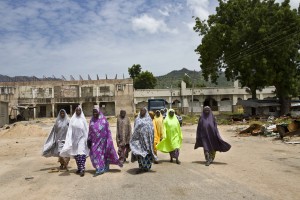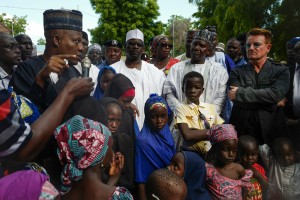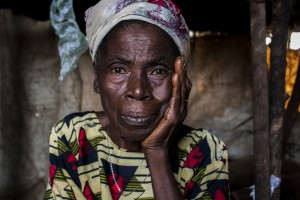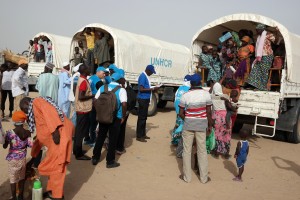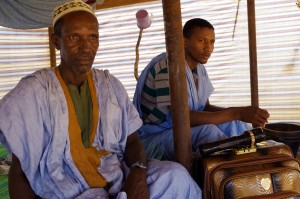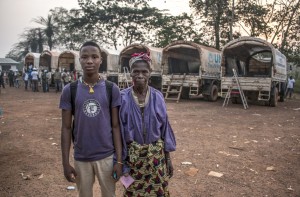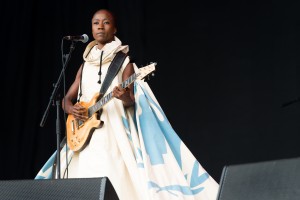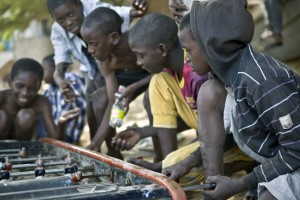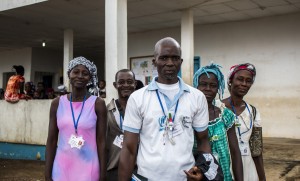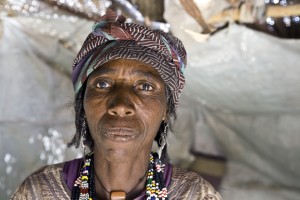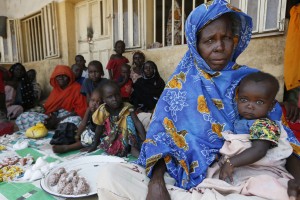Senegalese artists join UNHCR in the fight against statelessness
Cheikh Lô and the group Bideew Bou Bess speak out and sing in support of stateless people
DAKAR, SENEGAL, 3 March – (UNHCR) – The Senegalese artist Cheikh Lô and the group Bideew Bou Bess decided to join UNHCR in the fight against statelessness. This commitment was taken recently on the occasion of the first anniversary of the Abidjan Declaration against this plight. A panel gathering statelesness specialists, Senegalese authorities, members of civil society and artists had been organised by UNHCR in Dakar.
‘I want to associate myself with UNHCR and bring my voice to fight against statelessness”, says the international renowned artist Cheikh Lô, who was named best “World Music Expo” artist in 2015. “In Europe, animals have documents and even passports to enable them to travel”, says an ironic Cheikh Lô to accentuate the importance of being documented and the reasons for his commitment to the issue. The sixty-year-old or so man with dreadlocks has been performing music for the past 40 years. His music combines reggae, funk and Senegalese rhythmic sounds, which makes it special. Known in Senegal for being outspoken, he frequently speaks out on various topics, and says he fights against social injustice. “There is a need for political will to resolve the issue of statelessness.”
Like Cheikh Lô, the band Bideew Bou Bess, which means “new star” in Wolof (the most spoken language in Senegal), also wants to accompany UNHCR in this fight. In a song called “I Belong “, especially written in the context of the statelessness campaign, the band’s three brothers – Baidi , Mactar and Ibrahima – describe in a moving text, supported by rap and R & B melody, the situation of stateless people and call to eradicate statelessness. “The phenomenon is quite serious and it is necessary that all voices unite to eradicate it,” says Baidi. Bideew Bou Bess is resolutely engaged on social issues in Senegal and regularly participates in awareness-raising activities on issues of education and health alongside non-governmental organizations or directly among communities.
“These talented artists have offered us a great contribution and a good opportunity to continue to highlight the issue of statelessness “, joyfully says Emmanuelle Mitte, specialist of statelessness issues at the UNHCR regional office in Dakar. “We cannot thank them enough for this commitment and hope that thanks to their support, the voices of the millions of people in West Africa who live in the shadow will be heard,” she concludes.
This high-level panel was opened by the Minister of African Integration of NEPAD (New Partnership for Africa’s Development) and the Promotion of Good Governance Mr. Khadim Diop. Other important figures of the civil society in Senegal such as Mrs Maimouna Baldé , Director of the Centre Guindi, Mrs. Fatoumata Ndiaye Gueye, President of the Women Lawyers Association, Ms. Sophie Faye, manager of Refuge Pikine and the NGO Village Pilote also played an important role in this meeting, as well as of course members of UNHCR . Ten million people are stateless worldwide, including one million in West Africa.
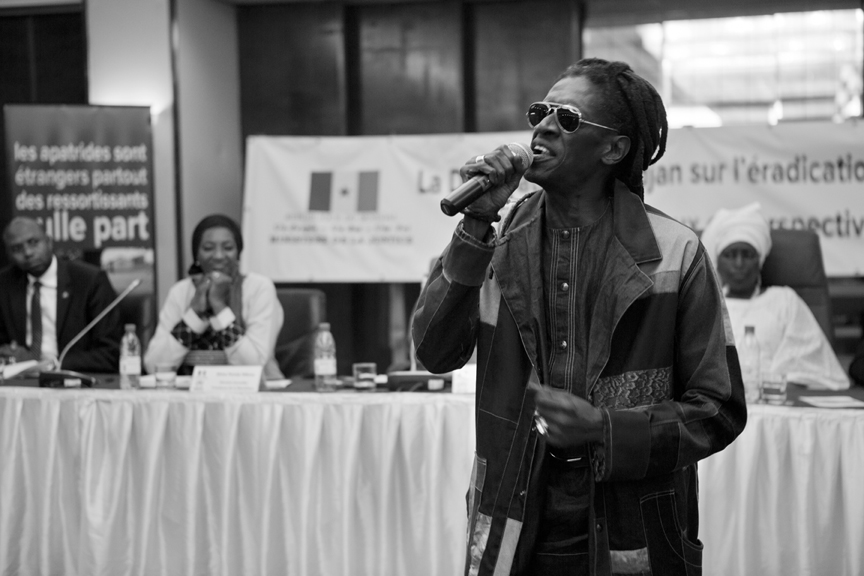
Cheick Lo sings “Degg Gui”, one of his most famous songs, for the one-year anniversary of the Abidjan Declaration in Dakar on 25 February. UNHCR / Helene Caux
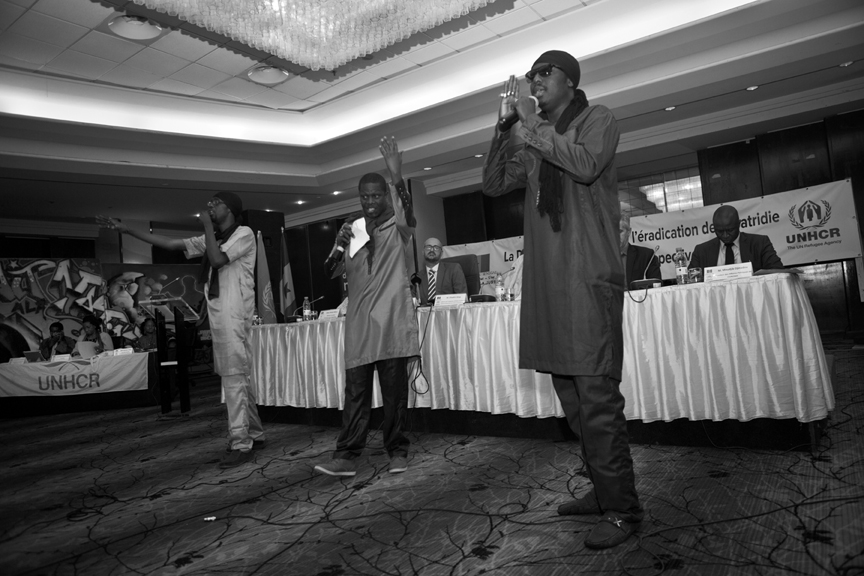
The three brothers from Senegalese band Bideew Bou Bess interpret “I Belong” , a song they specifically composed for the one-year-anniversary of the Abidjan Declaration to fight statelessness in West Africa. UNHCR / Helene Caux
Le texte en français:
Des artistes sénégalais s’engagent auprès du HCR pour lutter contre l’apatridie
Cheikh Lô et le groupe Bideew Bou Bess parlent et chantent en faveur des apatrides
DAKAR, SENEGAL, 3 mars 2016 (HCR) – Les artistes sénégalais Cheikh Lô et le groupe Bideew Bou Bess ont décidé de s’engager auprès du HCR pour lutter contre l’apatridie. Cet engagement a été pris récemment à l’occasion de la célébration du premier anniversaire de la déclaration d’Abidjan contre ce fléau. Un panel, réunissant des spécialistes de l’apatridie, des autorités sénégalaises, des membres de la société civile et des artistes, avait été organisé à Dakar par le HCR.
"Je veux m’associer au HCR et apporter ma voix pour la lutte contre l’apatridie", déclare Cheikh Lô, artiste de renommée internationale, désigné en 2015, meilleur artiste World Music Expo (Womex). "En Europe, les animaux ont des documents d’identité et même des passeports pour leur permettre de voyager" ironise Cheikh Lô pour montrer l’importance de la documentation et les raisons de son engagement. Ce sexagénaire aux dreadlocks abondants a 40 ans de musique derrière lui. Sa musique allie à la fois reggae, funk et des sonorités rythmiques sénégalaises ce qui la rend spéciale. Connu au Sénégal pour son franc-parler, il intervient sur des sujets variés, et dit lutter contre l’injustice sociale . "Il faut une volonté politique pour résoudre la question de l’apatridie".
Tout comme Cheikh Lô, le Groupe Bideew Bou Bess, qui signifie "nouvelle étoile" en Wolof (langue la plus parlée au Sénégal), souhaite accompagner également le HCR dans ce combat qu’il juge juste. Dans une chanson intitulée "I Belong" réalisée spécialement dans le cadre de cette campagne de lutte contre l’apatridie, les trois frères - Baidi, Mactar et Ibrahima - qui composent le groupe décrivent dans un texte poignant, soutenu par une mélodie rap et R&B, la situation des apatrides et appellent à éradiquer ce fléau. "Le phénomène est assez grave et il faut que toutes les voix s’unissent pour l’éradiquer", affirme Baidi. Bideew Bou Bess est résolument engagé dans le domaine social au Sénégal et participe régulièrement à des activités de sensibilisations sur les questions d’éducation, de santé à côté des organisations non -gouvernementales ou tout simplement auprès des populations.
"C’est une belle contribution et une bonne opportunité de continuer à mettre l’accent sur l’apatridie que nous offrent ces talentueux artistes" se réjouit Emmanuelle Mitte, spécialiste des questions d’apatridie au bureau régional du HCR à Dakar. "Nous ne les remercierons jamais assez pour cet engagement et espérons qu’avec ce soutien, la voix de ces centaines de milliers d’individus en Afrique de l’Ouest qui vivent dans l’ombre sera entendue".
Ce panel de haut niveau avait été ouvert par le Ministre de l’intégration Africaine du NEPAD (New Partnership for Africa's Development) et de la Promotion de la Bonne Gouvernance M. Khadim Diop. D’autres personnalités importantes de la société civile au Sénégal en occurrence Mme Maimouna Baldé, Directrice du Centre Guindi, Mme Fatoumata Gueye Ndiaye, Présidente de l’Association des Femmes Juristes, Mme Sophie Faye, Responsable du Refuge Pikine et l’ONG Village Pilote ont pris une part active à cette rencontre, ansi que biensûr des membres du HCR. Dix millions de personnes sont apatrides dans le monde, dont un million en Afrique de l’Ouest.
